
Why I Parted Ways With Chávez
Caracas, Venezuela
ON Dec. 17, 1982, three of my fellow officers in the Venezuelan Army and I swore our allegiance to the Bolivarian Revolutionary Army 2000. We considered ourselves to be at the birth of a movement that would turn a critical eye on Venezuela’s troubled social and political system — and formulate proposals to improve it. One of the officers with me was Hugo Chávez, the current president of Venezuela, whom I have known since I entered the military academy 35 years ago.
Hugo Chávez and I worked together for many years. I supported him through thick and thin, serving as his defense minister. But now, having recently retired, I find myself with the moral and ethical obligation as a citizen to express my opposition to the changes to the Constitution that President Chávez and the National Assembly have presented for approval by the voters tomorrow.
The proposal, which would abolish presidential term limits and expand presidential powers, is nothing less than an attempt to establish a socialist state in Venezuela. As our Catholic bishops have already made clear, a socialist state is contrary to the beliefs of Simón Bolívar, the South American liberation hero, and it is also contrary to human nature and the Christian view of society, because it grants the state absolute control over the people it governs.
Venezuelan society faces a broad array of problems that have not been addressed in the eight years Mr. Chávez has been in office, even though the present Constitution offers ample room for any decent, honest government to do so. Inflation, threats to personal safety, a scarcity of basic supplies, a housing shortage and dismal education and health care are problems that will not be resolved by approving this so-called reform.
How is it that we, the people of Venezuela, have reached such a bizarre crossroads that we now ask ourselves if it is democratic to establish the indefinite re-election of the president, to declare that we are a socialist nation and to thwart civic participation?
The answer is that all Venezuelans, from every social stratum, are responsible for the institutional decay that we are witnessing. The elite never understood — and still fail to understand — the need to include, in every sense, the millions who have been kept at the margins of the decision-making process because of their poverty. At the same time, President Chávez led the poor to believe that they are finally being included in a governmental model that will reduce poverty and inequality. In reality, the very opposite is true.
In recent years, the country’s traditional political parties have come to see the Venezuelan people as clients who can be bought off.
During the economic boom years, ushered in by a sustained increase in oil prices, the parties dispensed favors, subsidies and alms. In the end, they taught the people about rights rather than obligations, thus establishing the myth that Venezuela is a rich country, and that the sole duty of a good government is to distribute its wealth evenly. President Chávez has been buying and selling against this idea, continuing to practice the kind of neopopulism that will reach its limit only when the country receives what economists call an “external shock.”
Exorbitant public expenditures, the recurrence of government deficits even at times of record-high oil prices, the extreme vulnerability of foreign investments, exceedingly high import tariffs, and our increased domestic consumption of fuel at laughably low prices are all signs of what lurks on the horizon. It now seems that, even without an appreciable dip in global oil prices, our economy may well come to a crashing halt. When it does, it will bring an end to the populism that the government practices and has tried to export to neighboring countries.
Venezuela will thrive only when all its citizens truly have a stake in society. Consolidating more power in the presidency through insidious constitutional reforms will not bring that about. That’s why the Venezuelan people should vote no tomorrow, and prepare to pursue a political culture that will finally be able to steer our beloved nation toward true economic and social progress.
Baduel en NYT: “Por qué rompí con Chávez”
El General Raúl Baduel escribe hoy un artículo en “The New York Times” titulado“Por qué rompí con Chávez”.
Por qué rompí con Chávez
Isaías Baduel
New York Times
El 17 de diciembre de 1982, tres de mis compañeros oficiales y yo juramos fidelidad al Ejército Bolivariano Revolucionario. Nos considerábamos parteros de un movimiento que miraría críticamente al catastrófico sistema político y social venezolano, y formularía propuestas para mejorarlo. Uno de los oficiales que me acompañaba era Hugo Chávez, hoy presidente de Venezuela, a quien he conocido desde que entré en la Academia Militar hace 35 años.
Chávez y yo trabajamos juntos por muchos años. Le apoyé durante los peores momentos, y le serví como ministro de Defensa. Pero ahora, poco después de retirarme, me encuentro moral y éticamente obligado como ciudadano a expresar mi oposición a los cambios a la Constitución que han sido presentados a los votantes para su aprobación, el día de mañana.
La propuesta, que aboliría los límites al mandato presidencial y expandiría los poderes del presidente, no es más que un intento de establecer un estado socialista en Venezuela. Como nuestros obispos católicos han dejado ya bien claro, un estado socialista es contrario a las creencias de Simón Bolívar, héroe de la independencia suramericana, y se opone también a la naturaleza humana y la percepción cristiana de la sociedad, pues da al Estado control absoluto sobre el pueblo gobernado.
Venezuela se enfrenta a un amplio abanico de problemas que no han sido atacados en los ocho años que Chávez ha estado en el gobierno, aunque la actual constitución provee un amplio margen para que cualquier gobierno decente y honesto lo hiciera. La inflación, amenazas a la seguridad personal, escasez de bienes de consumo básico, déficit de viviendas y deprimentes servicios de educación y salud son los problemas que no se resolverán con la aprobación de esta mal llamada reforma.
Es así como nosotros, el Pueblo de Venezuela, hemos llegado a esta difícil encrucijada, en la que debemos preguntarnos si es democrático establecer la reelección indefinida del Presidente, declararnos como nación socialista y eliminar la participación cívica.
La respuesta es que todos los venezolanos de todas las clases sociales somos responsables del deterioro institucional que estamos presenciando. La élite nunca comprendió - y aún no comprende - la necesidad de incluir, en todos los sentidos, a los millones que, por su pobreza, han sido dejados al margen del proceso de toma de decisiones.
Al mismo tiempo, el Presidente Chávez ha llevado a los pobres a creer que están siendo incluidos por fin en un modelo gubernamental que reducirá la pobreza y la desigualdad. Pero la realidad indica todo lo contrario.
En los años recientes, los partidos políticos tradicionales llegaron a ver al pueblo venezolano como clientes que podían ser comprados. Durante los años de boom económico, propiciados por alzas significativas del precio del crudo, los partidos dispensaron favores, subsidios y regalos. Al final, enseñaron al pueblo sobre sus derechos pero no sobre sus obligaciones, estableciendo así el mito de que Venezuela es un país rico y que el único deber del gobierno es repartir equitativamente esa riqueza.
El Presidente Chávez ha continuado esta práctica neopopulista que llegará a su límite únicamente cuando el país reciba aquello que los economistas llaman “un shock económico”.
Los gastos públicos exorbitantes, los recurrentes déficits fiscales incluso en época de precios petroleros récord, la extremada vulnerabilidad de la inversión extranjera, las tarifas de importación extremadamente altas y nuestro creciente consumo doméstico de combustible a precios risiblemente bajos son las señales de lo que se avecina en el futuro. Parece que, aún sin una baja apreciable en los precios globales del crudo, nuestra economía bien podría llegar a una parálisis demoledora. Y cuando suceda, llegará a su fin el populismo que el gobierno practica y que ha tratado de exportar a los países vecinos.
Venezuela prosperará solo cuando todos sus ciudadanos tengan una verdadera participación en la sociedad. Consolidar más poder en la Presidencia a través de reformas constitucionales insidiosas no logrará ese cometido. Es esa la razón por la que el pueblo venezolano debe votar No mañana, y prepararse para encontrar una cultura política que finalmente pueda llevar a nuestra amada patria hacia un verdadero progreso económico y social.
http://www.noticias24.com/actualidad/?p=10108











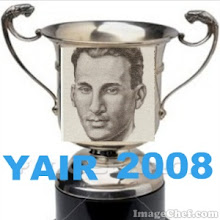
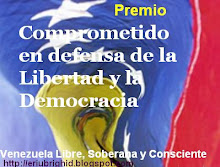
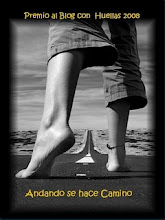




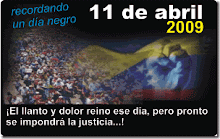






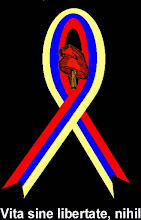

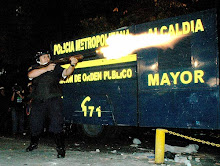








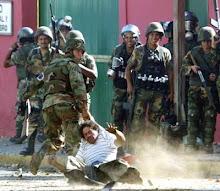












No hay comentarios:
Publicar un comentario